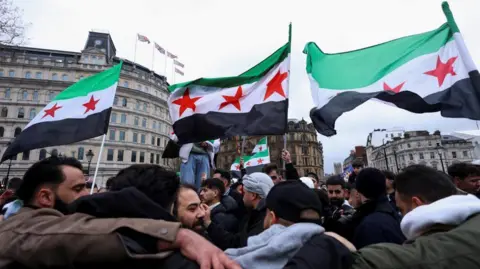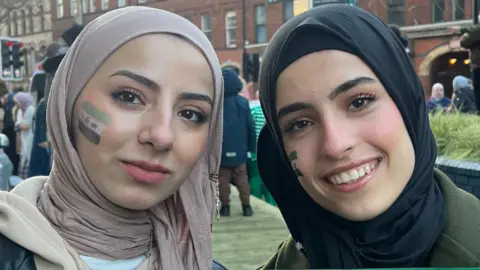'Incredible but uncertain': Syrians in UK react to Assad's downfall
 Reuters
Reuters"I would love to go to visit, to somehow dream of a new place, of a new Syria," Issam Kourbaj tells the BBC.
Mr Kourbaj is an artist who has lived in the UK for more than 30 years and now, aged 61, he is thinking of returning to his home country.
For decades, he has been unable to speak freely to his family in Syria, through fear there could be dangerous repercussions for them.
"This moment has been long awaited but I am really in two minds," he said.
"In one I am relieved, and in the other one I am cautious, because one does not know what is coming next.
"It is a very, very emotional place, but also very uncertain."
Mr Kourbaj is among many Syrians across the UK who are welcoming the fall of Bashar al-Assad's regime.
The ousted Syrian president - who is in Moscow having been granted asylum by Russia - fled the country after his government fell to a lightning rebel offensive on Sunday morning.
Twenty-four hours of intense emotion followed, with Syrian diaspora gathering in cities such as Belfast, Manchester and London to dance and sing.
The BBC spoke to some Syrians living in the UK about their feelings following the news.
Since 2011, Mr Kourbaj's work as an artist has been a response to the conflict in his home country. It is part of the permanent collection in the British Museum and he has an exhibition this year at Kettle's Yard in Cambridge.
Mr Kourbaj said he and his family in Syria have had to communicate with phone calls full of "codes" and "silences" for years.
"I then need to decipher these codes and make something out of it," he said.
"But of course, I cannot overdo it, because I am always worried how this might affect them and how they might actually be treated, because the regime is a very brutal regime."

The BBC also spoke to Syrian national Rama Terkmani, 20, who is studying medicine at the University of Central Lancashire.
She has lived in Liverpool with her mother, father and two older brothers for nine years.
"Finally my country is free," she said.
"My cousin, who's 14, lost his mum and dad in prison. He's still in Syria.
"My brother was in prison when he was 16 up until age 20, when he came to the UK, and he's been mentally affected.
"My uncle is still in Syria. I spoke to him today and he told me a lot of things that he wasn't able to tell me before.
"But now he can speak freely."
Ms Terkmani said while her family "feels much better - safe", they do not feel they are able to go back just yet.
"We still don't know what will happen but we're going to have a big party now," she said.
But for some, the prospect of going home evokes painful memories.
Amneh Khoulani is a human rights activist who says she was tortured in a Syrian prison, and came to the UK in 2016. She told the BBC she had barely slept in days.
She welcomed Assad's downfall, but said she could not help but think of her three brothers – also imprisoned by the regime.
She has not seen them since 2011, and their whereabouts are unknown.
"It is something very, very difficult to explain," Ms Khoulani said of her feelings this week.
"Our dream's come true, but I still do not get any information about my brothers."
Now a UK citizen, Ms Khoulani said she would likely return to Syria for the first time in a decade to see the country rebuilt.
But the idea of going home is "very painful," she said.
"Every street, every town in my country, every place, every shop, everything reminds me of my brothers."
Crying, she remarked: "They don't even have a grave."

Meanwhile, Rim Turkmani, director of the Syria Conflict Research Programme at the London School of Economics, dreams of visiting her home country again.
She has not seen her family in Syria for 14 years.
"I haven't been allowed in," she said. "Just seeing my family, my town that I grew up in... I was dreaming of this every day."
But Dr Turkmani says there will be obstacles ahead.
"We're waiting to see how the logistics are going to work," she said.
"It's still not possible to fly to Syria, so the airport is still closed. It's extremely difficult to go through Lebanon right now.
"My Syrian passport expired 10 years ago. Can I use a Western passport? Do I need a visa? Who's going to give me this visa?
"There are so many unclear questions, but it's going to be very emotional for me."
Dr Turkmani described Assad's fall as "incredible" but said "the future is unclear".
"I feel I need to be there to believe what's going on," she said.
Thousands of Syrians tried to begin the long journey back to their homes on Sunday, with huge queues forming to get into the country.
Pictures showed hundreds of Syrians with bags and suitcases gathered on the Lebanese border.
The United Nations High Commissioner for Refugees has said there is already some evidence of Syrians returning.
Dr Turkmani said Syria would not prosper if people did not return, and that "the most important demographic" needed would be young men.
"These are the men who are usually taken for conscription, and they will leave the country to avoid conscription," she said.
"But we need to get the economy up and running so that there will be jobs for those people who are going back, so that they have money to fix their houses that have been damaged during the conflict.
"And, of course, that would ease the tension in the neighbouring countries that was arising because of the presence of a large number of refugees."

Renad Soda took part in celebrations in Belfast on Sunday night. She moved to Northern Ireland nine years ago, when she was seven.
"We couldn't believe it, the feeling is unbelievable," Renad Soda told BBC News NI.
"I couldn't sleep all night watching the news, I'm really happy and I wish I can go back as soon as possible, as soon as everything calms down.
"Where I was living was being bombed and it was dangerous for us, my family just wanted us to be safe.
"I'm sure that everybody is so happy celebrating this amazing news after so many years."

Mazen Haseno helped organise the demonstration in Belfast.
He said the majority of Syrians living in Northern Ireland are "against the regime" and "had to leave because they feared for their lives".
"[We are] over the moon - so, so happy," he said.
"Syrian people cannot describe the feeling. It's like a really warm feeling inside."
Before arriving in Northern Ireland eight years ago, Mr Haseno said he was imprisoned and "tortured by the Syrian regime" for two-and-a-half years.
He said many Syrians had been traumatised by Assad: "Finally he's gone now, after 14 years, hopefully we will have a democratic country now".
He intends to return to Syria "as soon as possible, when it's safe".
